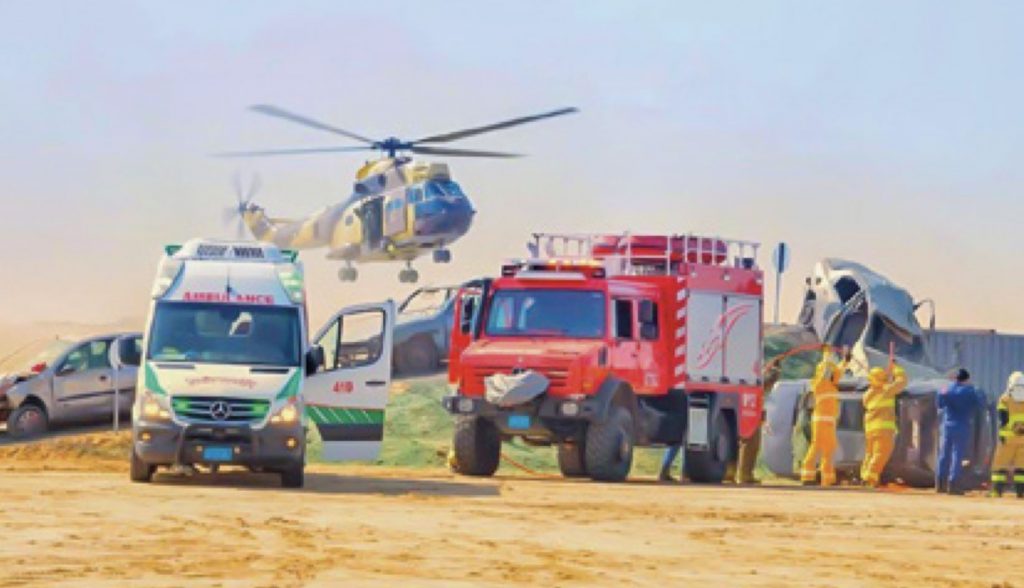by Major Abdullah M. AlSaleem, Kuwait Fire Service Directorate, Kuwait City
Based on science and knowledge, organisations strive to achieve the necessary progress that serves societies and provides them with the necessary security and protection.
Along with the rapid technological progress we are experienc- ing nowadays, countries all over the world become small vil- lages, connected and either positively or negatively affected by each other, depending on events. In this context, the role of the various organisations and bodies emerge. They maintain safety and afford protection as well as providing a dignified life. Despite their different specialisations, be it regional or inter- national organisations, government bodies, public beneficiary organisations, or even individuals, all these collaborators constitute parts of the chain of protection and societal progress (according to the chain theory). Yet, here in Kuwait, we believe in teamwork and that individual building comes first through scientific and cognitive armament, working within the team, with humanitarian goals, for the sake of the common interest. Thus, we continue to have all forms of joint practices, and research to reduce various crises and disasters in the early stages. We make sure that we coordinate and exchange infor- mation, and then apply this on the ground. We also conduct studies to find out the pros and cons of the application, define the procedures and regularly update them.

Holistic excercises
The annual meeting, held in the State of Kuwait, was a holistic exercise in which more than 31 governmental and private agen- cies participated in planning and unifying procedures and the joint field response to disasters. This meeting constituted of a series of holistic exercises (2015: disasters due to thick fog, 2016: torrents and floods, 2017: aircrafts and airports accidents, 2018: oil installations and CBRN incidents, 2019: earthquakes and natural disasters, 2020: joint command ) under the supervision of national and international monitoring bodies (such as the United Nations, the European Union initiative for Centres of Excellence, the International Civil De- fence Organisation, and NATO…).
Leadership training
In our last exercise in 2020, national teams of lower levels (second part of the middle Command) were prepared and assigned to carry out more senior tasks such as leadership, based on a joint com- mand system and round table decision-making, and under the supervision and follow-up of their specialised lead- ership. This exercise aims at qual- ifying leaders for the coming years and generations, which is one of the most important goals of the comprehensive national exercises series that we evaluate, to prepare them for the latest updates on the threats and risks identified, like possible biological, nuclear, radiological and chemical disasters. A general framework was set for this matter, along with an internal evaluation, identification of needs, providing the national CBRN team with the human capabilities and the necessary equipment, machinery, and technology. After that, they develop plans and hypotheses for accidents, subsequently applying them on the ground to determine the extent to which teams are ready, address gaps, and raise capabilities. In my opinion, these exercises, whether in an office or operational planning, represent the real test of the readiness of organi- sations and bodies. Yet, coordination and planning between agencies alone does not guarantee their effectiveness, but the application of crisis management processes and quality testing does. (“Knowledge needs action”, as wrote Ali Ibn AbiTalib, 4th Calif of the Rashidun Calipahate).
Planning, coordination, and implementation
Our experience in the State of Kuwait of managing crises and biological disasters is based on three main pillars, namely planning, coordination, and implementation. In light of the challenges we are currently witnessing and the risks we face (CBRN), we are making efforts at various levels to reduce them, mitigate their damage or even attempt to stop them according to the fundamentals of crises and disasters, which are usually caused by two reasons and are either natural or man-made disasters. With terrorist threats, sabotage and cross-border human errors, we as agencies and organisations must join all our capabilities and efforts to support coordination and the exchange of information locally, regionally and internationally, and act as one system facing a common destiny. Today, as a Focal Point of the European Union initiative and through what we have done with the members and other Focal Points, we have contributed to the progress of the national teams.
I am convinced that all of us have to intensify our coordination efforts and work in the European Union Centres of Excellence initiative to grow and move forward.






